
If you want to see into the future of cancer care, look at the scientific discoveries being developed today right here in Ontario.
Since its inception in 2005, OICR has continued to develop the tools and technologies to improve cancer outcomes for patients and generate economic benefits for Ontario. We are also helping lay the groundwork for a transformation in how cancer is prevented, detected, diagnosed and treated.
"By looking back at OICR’s achievements and how they have shaped cancer research over the past year, this report provides a glimpse of what is possible in years to come."
Dr. Laszlo Radvanyi, PhD, President and Scientific Director

Featured story
Tough to detect, quick to spread and stubbornly resistant to treatment, pancreatic ductal adenocarcinoma (PDAC) is one of the deadliest forms of cancer.
Most people won’t have symptoms in the early stages, giving pancreatic tumours — which can metastasize when they’re no bigger than a fingernail — plenty of chance to spread.
By the time PDAC is detected, it’s often too late for surgery. Fewer than one in 10 people will live five years past their diagnosis.
But advancements in genomic sequencing have opened a new window into what makes PDAC so challenging.
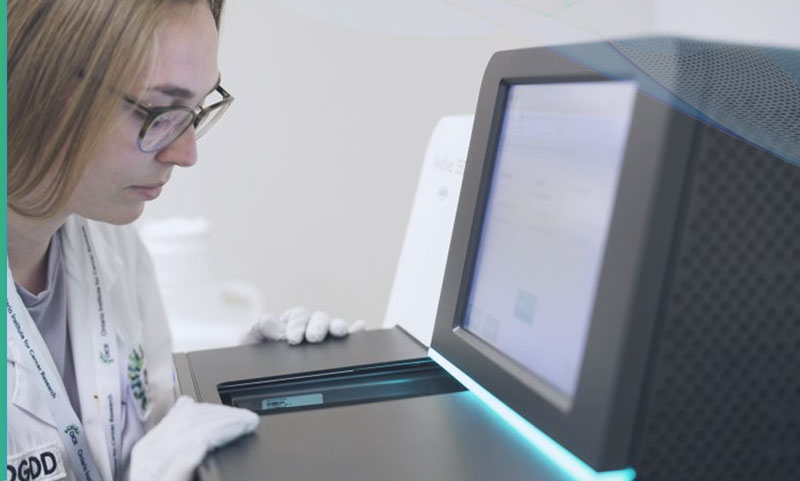
OICR led a major push to study and catalogue molecular data about pancreatic cancer that is generating key insights on how best to treat it. And OICR’s unique Pancreatic Cancer Translational Research Initiative (PanCuRx) is turning those insights into real-world treatment decisions.

"The way we’re applying molecular knowledge to clinical decision-making in real time is very cutting edge and hopefully it can offer a better path for people with pancreatic cancer"
Dr. Steven Gallinger, Head, Clinical Translation and Co-Lead, PanCuRx
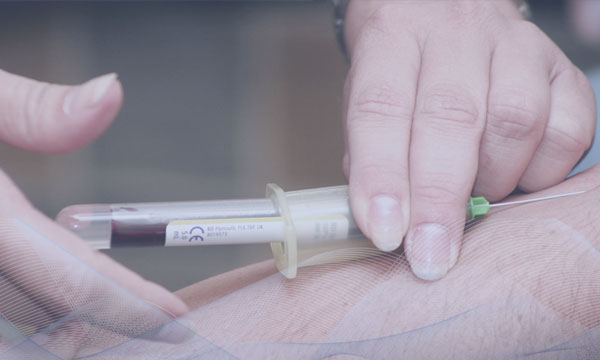
New insights on how blood stem cells age could provide clues about who is likely to develop blood cancers.
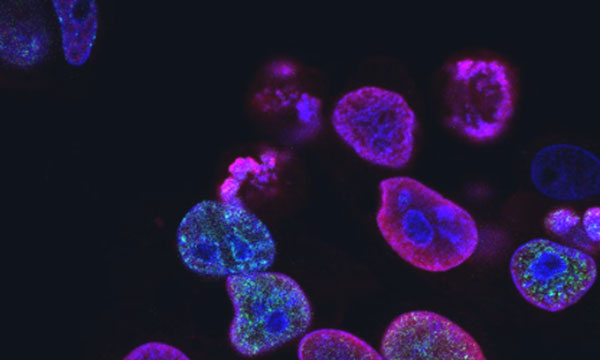
It only takes a minutes to analyze the millions of cells in a tumour using a new A.I.-driven technique.

By looking where few have looked before, researchers found new biomarkers to predict how aggressive certain brain cancers will be.
Read moreabout prognostic biomarkers and cancer-driving genes
Quick facts
4,700+ patients have been recruited to
162 OICR-supported clinical trials.
(2021-22)
2,097 highly qualified personnel
across Ontario enhanced their knowledge through participation in OICR-supported projects (2021-22)
2,500+ students
hosted by OICR-funded projects (since inception)
4,100+ educational events
supported by OICR to share knowledge and provide training (since inception)
21 patient partners
contributed to OICR research projects (2021-22)
Featured story
The ‘best’ treatments for breast cancer can vary dramatically from patient to patient. Different tumours respond differently to chemotherapies and targeted drugs, and finding the best treatment is about matching a patient’s specific form of cancer to the therapies with the best chance of stopping it.
This tailored approach to oncology is often called ‘precision medicine’ and it’s one of the core objectives of OICR’s Diagnostic Development program.

"We develop tools to help understand each patient’s unique cancer so that they can receive the therapies they will benefit most from"
Dr. Jane Bayani, Co-Director and Principal Research Scientist, Diagnostic Development
But these tools don’t come easy. It takes a deep understanding of cancer’s underlying biology and a commitment to translating that understanding into clinically useful diagnostic tests.
Dr. Jane Bayani and her fellow Co- Director Dr. Melanie Spears have spent nearly a decade developing two promising tests to predict how breast cancer patients will respond to treatment. Buoyed by collaborations across OICR, they have translated their innovations from the early days of biomarker discovery to the cusp of being adopted into the clinic, where they can help inform precision medicine decisions for the one in eight Canadian women who develop breast cancer.
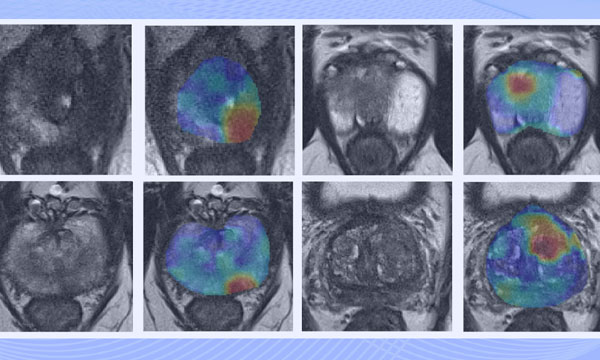
An innovative MRI technology is harnessing one of cancer’s unique properties – its irregular density -- to ‘light up’ cancerous tissue.

A new gene signature test can improve early treatment decisions for acute myeloid leukemia by quickly assessing a patient’s risk of relapsing after treatment.
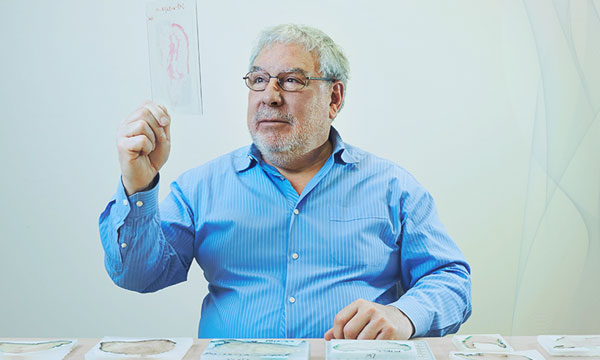
Over nearly half a century researching medical imaging, Dr. Martin Yaffe has literally changed the way we see breast cancer.

COVID-19 has caused delays in cancer diagnoses, but Ontario can learn from the pandemic by investing in early detection.
Featured story
To unlock a new class of cancer-killing drugs, OICR researchers are looking for keys among a previously overlooked family of proteins.
WD-repeat proteins play an important part in many cellular processes by acting as ‘scaffolding’ proteins and thus bring different proteins together.
This family of more than 300 proteins was traditionally seen as difficult to drug. Most drug discovery efforts focus instead on other targets such as enzymes that play a driving role in many cellular functions.
But an OICR collaboration with the Structural Genomics Consortium (SGC) has found there is more to these unassuming proteins than initially thought, and that inhibiting them with small molecules could play an important role in slowing down cancer.
"We’re learning that targeting the protein-protein interactions regulated by WD-repeat proteins causes consequences that could be clinically relevant to cancer"
Mahmoud Noureldin, fourth-year PhD student at the University of Toronto based in OICR’s Drug Discovery team
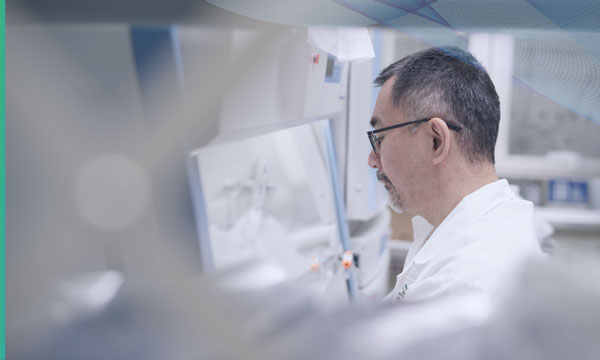

The first platform to manufacture made-in-Canada CAR-T cells is offering Canadians access to life-changing immunotherapy.

A trial compared surgery versus radiation for throat and tongue cancers to find which treatment option delivered the best quality of life.
Read moreabout quality of life treatment for throat and tongue cancers

A groundbreaking clinical trial found new insights about how a common immunotherapy drug works on different cancer types.
Read moreabout how a common immunotherapy drug works on different cancer types

Tests used to predict women’s risk of breast cancer recurrence may also work for men, according to a unique OICR study.
Read moreabout how predicting women’s risk of breast cancer recurrence may also work for men
Quick facts
OICR-supported researchers contributed to
710 publications in 2021-22, which have already been cited more than 3,600 times, more than 2.5 times the world average
42 researchers
attracted to Ontario as a result of OICR-supported projects
OICR collaborates with people at
580+ organizations from
30 countries around the world
100% of research projects
considered equity, diversity and inclusion in their proposals
Featured story
For Dr. Saumik Biswas and the entrepreneurs behind the robotic ultrasound technology code-named the ‘Lymphonator’, the 2021 FACIT Falcons’ Fortunes competition was a valuable learning experience.
Biswas and his team from Western University are experts in their field, creators of a groundbreaking device that detects lymph nodes in surgically removed colorectal cancer tissues faster and more accurately than manual examination. But presenting their innovation to a panel of judges from venture capital and the life sciences industry, with the clock ticking, for a chance at the award and investment, was uncharted territory.
“That was our team’s first pitch competition, and it was a new challenge for us,” Biswas says. “It forced us to thoroughly investigate, understand and communicate our technology and our commercialization strategy in just 10 minutes.”
Although they didn’t end up winning the grand prize at Falcons’ Fortunes, the Lymphonator team left the competition with the ‘Audience Choice Award’ for their engaging pitch, as well as a solid understanding of their commercialization needs and value in the market. The experience helped them win subsequent pitch competitions and put them on track to be awarded critical seed capital – much needed given the early stage of their technology – through FACIT’s Prospects Oncology Fund that year.
“Our ongoing connection to FACIT has been critical in moving our innovation forward along our commercialization pathway,” says Biswas, who is now CEO, President and Founder of the resulting spin-off company Tenomix Inc. “It has helped us reach several critical milestones in a short period.”
With the support of OICR and FACIT:
3 new start-up companies established (2021-2022)
33 start-ups established (since inception)
640 employees
at all active start-ups in our portfolio

High-level accreditation for OICR’s Genomics lab will open more opportunities to support clinical trials.

A COVID-19 data portal built in record time by OICR’s software engineering team will help build a better understanding of the disease.

A new cloud computing platform has made a massive collection of cancer data available to researchers worldwide.

Research about clinical trials for new cancer drugs suggests they don’t always measure the outcomes that matter most to cancer patients.

OICR’s commitment to equity, diversity and inclusion (EDI) will ensure that people from all communities contribute to and benefit from this new era of cancer innovation.

A new Patient Partnership Plan builds on years of work by OICR to integrate patient perspectives across its all of our research programs.

Tom Ouelette is a PhD candidate who developed a way to predict how cancer evolves using deep learning algorithms.

Clare Park is a PhD candidate harnessing 3D ultrasound technology to diagnose hard-to-detect breast cancers.
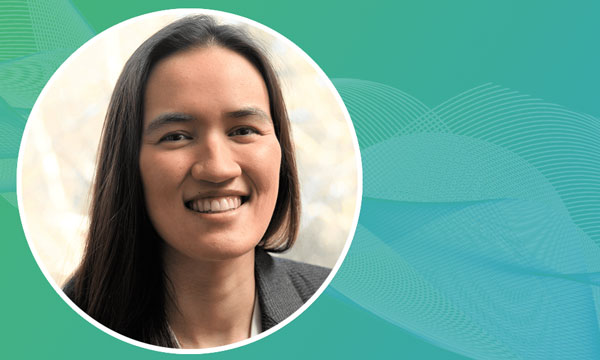
Laura Bumbulis is an undergraduate student who helped identify gene mutations in pancreatic cancer.